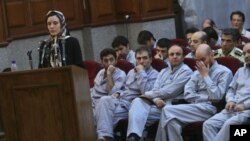A French academic arrested for allegedly participating in a wave of unrest following Iran's disputed June, 2009 presidential election is about to be released, according to her Iranian attorney. Iranian president Mahmoud Ahamdinejad had, at one point, tied her release to that of two Iranians, detained in France.
The attorney for French academic Clotilde Reiss, who was arrested by Iranian authorities in July 2009 amid post-election unrest, is saying that she will be allowed to leave the country, soon.
Her Iranian lawyer Mohammad Mahdavi-Sabet made the announcement Saturday. Iranian officials have yet to confirm that Reiss will be set free.
An Iranian Revolutionary Court put her on trial last August, along with dozens of Iranian opposition supporters for allegedly participating in what the court called "rioting and civil strife." She was also accused of spying, because of two emails she sent describing the protests.
Reiss told the court she took part in several demonstrations, and was set free on bail in mid-August. She has lived at the French Embassy, since then, awaiting permission to leave the country.
Iranian President Mahmoud Ahmadinejad, in an interview last year, tied her release to that of two Iranians being held in France. One was an Iranian businessman, whom the U.S. had asked be extradited, and the second was the murderer of former Iranian Prime Minister Shahpour Bakhtiar.
Former French Ambassador to Iran Francois Nicoullaud argues that French justice would ultimately have released both Iranians, as the law followed its course, and that he does not believe that any deal was struck to obtain Reiss' release. "I sincerely believe that there was no deal between the Iranians and the French. I believe that the Iranians made a big mistake at the time-and Mr. Ahmadinejad made a big mistake-by saying 'yes, we would like to exchange two Iranians who are in France for Ms. Reiss. In fact, the cases of the two Iranians were going the legal way, and the two people were going to be released," he said.
Earlier this month, a French court refused an American request to extradite Iranian businessman Majid Kakavand, accused of violating an American embargo on exporting sensitive technology to Iran. Ambassador Nicoullaud says that the U.S. law, in any case, was not applicable in France. "The extradition was asked (for) by the United States considering United States sanctions, which were not valid in France. So, it was evident that this guy was going to be released," he said.
French Foreign Minister Bernard Kouchner and other French leaders have repeatedly demanded that Tehran release Reiss, rejecting Iranian charges that she was a spy.
Meanwhile, top Tehran prosecutor Abbas Jafari Dolatabadi announced Saturday that death sentences for six opposition activists have now been confirmed. Jafar Kazemi, Mohammad Ali Saremi, Mohammad-Ali Haj-Aghai, Ahmad Daneshpour Moghadam, Mohsen Daneshpour Moghadam and Alireza Ghanbari were accused of being mohareb, or "enemies of God." These activists were arrested in protests after last year's disputed presidential election in Iran.
Iran Expected to Release French Academic Arrested Last July




